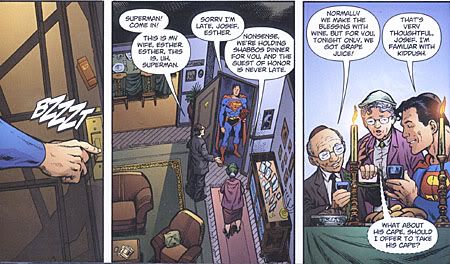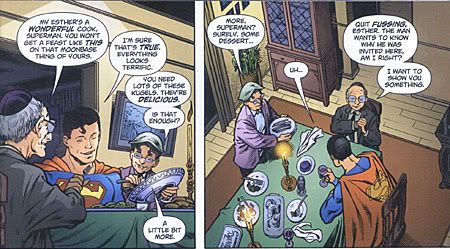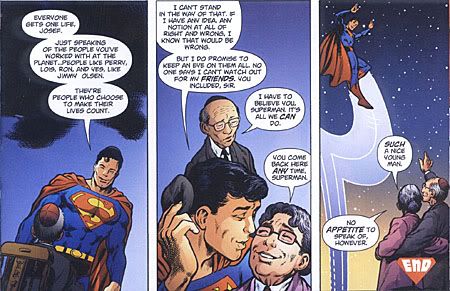Guess Who’s Coming To Shabbos Dinner?
Action Comics #835
When I read the most recent Action, I wondered about how accurate the final scene was, so I fired off an e-mail to My friend Mordechai. Here are his comments regarding this scene:
Hi. My name’s Mordechai, but you can call me Typo Lad. Everyone else does. I run a little blog called "What WERE They Thinking?!". I’m a comic book fan, obviously. I’m also an Orthodox Jew. Now, while there are lots of Jews in comic books (Kitty Pryde, Doc Samson, Two Gun Kid, Moon Knight, etc) there are very few Orthodox Jews. By this I mean head-covering, Shomer Shabbos Jews (Refers to one who keeps the laws of the Sabbath). The closest I’ve ever seen in any comic were two separate incidents where Justice and The Thing said Kaddish (the mourner’s prayer).
Then came Gail Simone’s run on Action Comics. In it, she introduced Josef, a Jewish reporter for the Daily Planet who wore a yarmulke (Kippah, beanie, skullcap). Now, shortly before, Gotham Central had shown a Detective with a yarmulke, but all he seemed to do was go on doughnut runs*, so he doesn’t really count. But this guy interacted with Jimmy and Superman and was an actual part of the story. He interacted to the point that he invites Superman to Shabbos dinner.
Which happened in the most recent issue #835. Which I am now going to nitpick the heck out of.
Let me start with a caveat: I am assuming Josef is Orthodox due to his dress, mode of speech, and the contents of his house. At the very least, we see that he is Shomer Shabbos. I am trying to be careful to not judge him by my own standards, but by comparing him to typical older adult Jewish males from my old neighborhood.
So let’s start:

Panel 1:
Okay, first off Superman, you’re being very rude. How, do you ask? By ringing the bell. Shomer Shabbos Jews do not use electricity on Shabbos and while a non-Jewish guest doesn’t have to not ring the bell, it’s considered a bit tacky. Next time, knock.
From an artistic perspective we also have a problem. See that funny looking box over the doorbell? That’s a Mezuzah. It’s a box containing a small scroll of parchment that Jews put on their doorposts. So what’s wrong with it? It’s too low and in the wrong place. Mezuzah’s should be at around eye level and are put on the inner part of the doorframe, not the outer part.
Panel 2:
Nice apartment! Kudos to John Byrne, who has drawn what looks like just about every apartment in Pelham parkway, The Bronx. Please note the candelabra on the buffet. This is a Menorah. A Chanukiah is what we light for Chanukah, but they are commonly called Menorahs for a reason I cannot find. Chanukiot consist of a total of 9 candleholders; one for each day of Chanukah (aka Hanukkah) plus a "Shamash". A Menorah can be six or eight (plus shamash). This may mean that someone in their family holds the same traditions as mine, and lit one candle for each member of the household. Not Esther, however, as we see later that there are just two candles at the table (more on that later). The lighting of only two candles is a fairly common practice.
Now we run into two problems from one source: The flowers.
Problem one: Flowers are Muktzah, meaning they cannot be "used" on Shabbos. You can’t move them and you especially cannot put them in water. No reason Superman should know this, but he’s basically saying "Hi, I got these for you. Go on, take them and violate the laws of Shabbos rather than offend the guy who can crush mountains in his bare hands!". Tch.
Problem two: less commonly known fact - you cannot accept gifts on Shabbos. This is actually a fairly complicated Halacha (law) that has to do with the fact that you cannot obtain property on Shabbos. Many people going to other’s houses for Shabbos meals will bring wine or candy, as that’s not a problem if they, the bringer, partake in it themselves at the meal itself.
So yeah, not doing so well at this point.
And to be really nitpicky: I hope Superman likes cold food. Jews don’t cook on Shabbos, only before. So the later he gets, the colder the food gets. Unless they got one of those fancy-shmancy warming plates that you can use, but most older Jews eschew that.
Panel 3:
Okay, grape juice instead of wine. Cute. And common. However, wine is considered more Chashuv (important) than grape juice, and as such if one has an important guest, it would be an insult to tell him "Normally we make the blessing with wine, but for you, tonight only, we got grape juice!". Now I know that Superman doesn’t drink, and there was a good story establishing why that is back in the '90s, but how does Josef know this?
Also, if those are rolls to Superman’s left? They should be covered. During Kiddush and until the blessing on the bread is made, any bread products on the table are covered.
Also, Josef should have told Kal-El that the yarmulke is really unnecessary. Only Jews need to wear those. Yes, if you go to a Bar Mitzvah or the Wailing Wall you’ll be asked to put one on, but that’s for other reasons. There’s no real reason for a non-Jew to cover his hair at someone’s Shabbos table. It’s sweet, but silly.
New page!

Panel 1:
Mmm. I wonder what kind of Kugels they are? My wife makes broccoli, potato, and corn Kugels. My mom makes this amazing Salt & Pepper lukshon (noodle) Kugel.
Kugels, for the uninitiated, are divine little souffle-like dishes.
Gail at this point has succeeded in making me hungry.
The dialogue at this point is actually starting to grate on me a bit and sound like typical "bubbie" talk. Still, what are you going to do?
Panel 2:
Love the breakfront. I have rarely been in a Jewish home in my life that did not have a breakfront. I also love how the candles have not visibly shortened at this point. Let me tell you something, by the time you get to dessert on a Shabbos dinner, the candles have burned out a long, long time before. Once they’re out, they’re out. No more lighting of fires until after Shabbos is over with.
Okay, let’s turn the page, shall we?

The last three panels confuse me. Superman’s dialogue clearly continues uninterrupted from panel four to panel five, yet suddenly Joseph is not only standing, but is behind him? Just feels jumpy.
These three panels have a few major slips:
Panel 4:
Superman, you’re really being very rude. You do not address someone who is sitting while you yourself are standing. You sit and talk to them at their level. Especially an older person. Very chutzpadick (rude and dismissive).
Panel 5
What? NO!
Superman, you mean to tell me you’re "familiar with Kiddush" but you don’t know rule one of Orthodox male/female interactions? That’d be look, don’t touch. You don’t kiss a Jewish woman on the cheek. Ever. Unless you’re family. This is a major error here.
Panel 6:
Wait, why did Esther take her Tichul (headscarf) off? I could understand if she wore one to light the candles and then took it off for the meal, but we see her wearing one for the meal, in her own home, and then when she’s outside, she takes it off? That’s very much backwards. Hair covering observation varies from person to person, even within the same family. Still, I’ve never met a woman who covers her hair in her home and then does not cover it when she goes out. Unless we’re supposed to believe that Esther is wearing a Sheitel (wig).
One important note: I like that Josef and Esther are observing the custom of walking the guest out of the house. Too many people these days don’t do that.
And would it have killed Ms. Simone to not use the stereotypical "Such a nice young man,"? In all my born days, I don’t think I’ve ever heard a Jewish person say that in a non-ironic sense.
Like I said above, these are nitpicks. This was actually a very respectful comic, especially when you consider that none of the creators involved are (to my knowledge) Jewish.
(Although with names like "Balsman" and "Schaeffer", maybe the Letterer and Assistant Editor have a bit of Hebriac blood in them)
I’ll be back some other time with topics like "Moon Knight: For This I got Ordained As a Rabbi?"
*Although it is important to note that there are apparently Kosher doughnut shops in Gotham. Cool factoid.
When I read the most recent Action, I wondered about how accurate the final scene was, so I fired off an e-mail to My friend Mordechai. Here are his comments regarding this scene:
Hi. My name’s Mordechai, but you can call me Typo Lad. Everyone else does. I run a little blog called "What WERE They Thinking?!". I’m a comic book fan, obviously. I’m also an Orthodox Jew. Now, while there are lots of Jews in comic books (Kitty Pryde, Doc Samson, Two Gun Kid, Moon Knight, etc) there are very few Orthodox Jews. By this I mean head-covering, Shomer Shabbos Jews (Refers to one who keeps the laws of the Sabbath). The closest I’ve ever seen in any comic were two separate incidents where Justice and The Thing said Kaddish (the mourner’s prayer).
Then came Gail Simone’s run on Action Comics. In it, she introduced Josef, a Jewish reporter for the Daily Planet who wore a yarmulke (Kippah, beanie, skullcap). Now, shortly before, Gotham Central had shown a Detective with a yarmulke, but all he seemed to do was go on doughnut runs*, so he doesn’t really count. But this guy interacted with Jimmy and Superman and was an actual part of the story. He interacted to the point that he invites Superman to Shabbos dinner.
Which happened in the most recent issue #835. Which I am now going to nitpick the heck out of.
Let me start with a caveat: I am assuming Josef is Orthodox due to his dress, mode of speech, and the contents of his house. At the very least, we see that he is Shomer Shabbos. I am trying to be careful to not judge him by my own standards, but by comparing him to typical older adult Jewish males from my old neighborhood.
So let’s start:

Panel 1:
Okay, first off Superman, you’re being very rude. How, do you ask? By ringing the bell. Shomer Shabbos Jews do not use electricity on Shabbos and while a non-Jewish guest doesn’t have to not ring the bell, it’s considered a bit tacky. Next time, knock.
From an artistic perspective we also have a problem. See that funny looking box over the doorbell? That’s a Mezuzah. It’s a box containing a small scroll of parchment that Jews put on their doorposts. So what’s wrong with it? It’s too low and in the wrong place. Mezuzah’s should be at around eye level and are put on the inner part of the doorframe, not the outer part.
Panel 2:
Nice apartment! Kudos to John Byrne, who has drawn what looks like just about every apartment in Pelham parkway, The Bronx. Please note the candelabra on the buffet. This is a Menorah. A Chanukiah is what we light for Chanukah, but they are commonly called Menorahs for a reason I cannot find. Chanukiot consist of a total of 9 candleholders; one for each day of Chanukah (aka Hanukkah) plus a "Shamash". A Menorah can be six or eight (plus shamash). This may mean that someone in their family holds the same traditions as mine, and lit one candle for each member of the household. Not Esther, however, as we see later that there are just two candles at the table (more on that later). The lighting of only two candles is a fairly common practice.
Now we run into two problems from one source: The flowers.
Problem one: Flowers are Muktzah, meaning they cannot be "used" on Shabbos. You can’t move them and you especially cannot put them in water. No reason Superman should know this, but he’s basically saying "Hi, I got these for you. Go on, take them and violate the laws of Shabbos rather than offend the guy who can crush mountains in his bare hands!". Tch.
Problem two: less commonly known fact - you cannot accept gifts on Shabbos. This is actually a fairly complicated Halacha (law) that has to do with the fact that you cannot obtain property on Shabbos. Many people going to other’s houses for Shabbos meals will bring wine or candy, as that’s not a problem if they, the bringer, partake in it themselves at the meal itself.
So yeah, not doing so well at this point.
And to be really nitpicky: I hope Superman likes cold food. Jews don’t cook on Shabbos, only before. So the later he gets, the colder the food gets. Unless they got one of those fancy-shmancy warming plates that you can use, but most older Jews eschew that.
Panel 3:
Okay, grape juice instead of wine. Cute. And common. However, wine is considered more Chashuv (important) than grape juice, and as such if one has an important guest, it would be an insult to tell him "Normally we make the blessing with wine, but for you, tonight only, we got grape juice!". Now I know that Superman doesn’t drink, and there was a good story establishing why that is back in the '90s, but how does Josef know this?
Also, if those are rolls to Superman’s left? They should be covered. During Kiddush and until the blessing on the bread is made, any bread products on the table are covered.
Also, Josef should have told Kal-El that the yarmulke is really unnecessary. Only Jews need to wear those. Yes, if you go to a Bar Mitzvah or the Wailing Wall you’ll be asked to put one on, but that’s for other reasons. There’s no real reason for a non-Jew to cover his hair at someone’s Shabbos table. It’s sweet, but silly.
New page!

Panel 1:
Mmm. I wonder what kind of Kugels they are? My wife makes broccoli, potato, and corn Kugels. My mom makes this amazing Salt & Pepper lukshon (noodle) Kugel.
Kugels, for the uninitiated, are divine little souffle-like dishes.
Gail at this point has succeeded in making me hungry.
The dialogue at this point is actually starting to grate on me a bit and sound like typical "bubbie" talk. Still, what are you going to do?
Panel 2:
Love the breakfront. I have rarely been in a Jewish home in my life that did not have a breakfront. I also love how the candles have not visibly shortened at this point. Let me tell you something, by the time you get to dessert on a Shabbos dinner, the candles have burned out a long, long time before. Once they’re out, they’re out. No more lighting of fires until after Shabbos is over with.
Okay, let’s turn the page, shall we?

The last three panels confuse me. Superman’s dialogue clearly continues uninterrupted from panel four to panel five, yet suddenly Joseph is not only standing, but is behind him? Just feels jumpy.
These three panels have a few major slips:
Panel 4:
Superman, you’re really being very rude. You do not address someone who is sitting while you yourself are standing. You sit and talk to them at their level. Especially an older person. Very chutzpadick (rude and dismissive).
Panel 5
What? NO!
Superman, you mean to tell me you’re "familiar with Kiddush" but you don’t know rule one of Orthodox male/female interactions? That’d be look, don’t touch. You don’t kiss a Jewish woman on the cheek. Ever. Unless you’re family. This is a major error here.
Panel 6:
Wait, why did Esther take her Tichul (headscarf) off? I could understand if she wore one to light the candles and then took it off for the meal, but we see her wearing one for the meal, in her own home, and then when she’s outside, she takes it off? That’s very much backwards. Hair covering observation varies from person to person, even within the same family. Still, I’ve never met a woman who covers her hair in her home and then does not cover it when she goes out. Unless we’re supposed to believe that Esther is wearing a Sheitel (wig).
One important note: I like that Josef and Esther are observing the custom of walking the guest out of the house. Too many people these days don’t do that.
And would it have killed Ms. Simone to not use the stereotypical "Such a nice young man,"? In all my born days, I don’t think I’ve ever heard a Jewish person say that in a non-ironic sense.
Like I said above, these are nitpicks. This was actually a very respectful comic, especially when you consider that none of the creators involved are (to my knowledge) Jewish.
(Although with names like "Balsman" and "Schaeffer", maybe the Letterer and Assistant Editor have a bit of Hebriac blood in them)
I’ll be back some other time with topics like "Moon Knight: For This I got Ordained As a Rabbi?"
*Although it is important to note that there are apparently Kosher doughnut shops in Gotham. Cool factoid.



 Greg over at
Greg over at